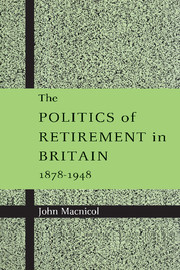Book contents
- Frontmatter
- Contents
- List of tables
- Acknowledgements
- Part I The campaign for old age pensions
- Part II Contributory pensions
- Part III The debate on retirement pensions
- Part IV The ‘Beveridge revolution’
- 13 The pensions crisis of the late 1930s
- 14 The Treasury enquiry and the 1940 Act
- 15 The origins and working of the Beveridge Committee
- 16 After the Beveridge Report, 1942–1948
- 17 Conclusion
- Index
15 - The origins and working of the Beveridge Committee
Published online by Cambridge University Press: 01 October 2009
- Frontmatter
- Contents
- List of tables
- Acknowledgements
- Part I The campaign for old age pensions
- Part II Contributory pensions
- Part III The debate on retirement pensions
- Part IV The ‘Beveridge revolution’
- 13 The pensions crisis of the late 1930s
- 14 The Treasury enquiry and the 1940 Act
- 15 The origins and working of the Beveridge Committee
- 16 After the Beveridge Report, 1942–1948
- 17 Conclusion
- Index
Summary
In June 1941, the Inter-Departmental Committee on Social Insurance and Allied Services under the chairmanship of Sir William Beveridge was appointed. This Committee originated in the general plans for postwar reconstruction that had begun in early 1941, at almost the lowest point in the war, under the overall direction of the same Arthur Greenwood who had led Labour's onslaught on the Chamberlain government over the pensions issue in 1939. The Beveridge Committee's initial purpose was to take over the work of a committee on the reform of workmen's compensation and health insurance, orginally chaired by Sir Hector Hetherington: this committee had been set up in 1938, at the TUC's insistence, but its work had been suspended in July 1940. During the war, the TUC had kept up pressure for a re-activation of the Hetherington Committee. In February 1941, the TUC General Council sent a deputation to Malcolm MacDonald, Minister of Health, requesting a reform of health insurance, and only accepted a slight expansion of health insurance in 1941 (a raising of the income limit for eligibility) on condition that a proper enquiry into it be set up. Significantly, the announcement on 22 May 1941 of a committee to review social insurance was made in tandem with one concerning the new Health Insurance Bill. Within the cabinet, Ernest Bevin – from his new position as Minister of Labour – continued to press for a reform of workmen's compensation. Thus in April 1941 discussions were held on the appointment of an inter-departmental committee of civil servants primarily to investigate both these areas of social policy.
- Type
- Chapter
- Information
- The Politics of Retirement in Britain, 1878–1948 , pp. 347 - 384Publisher: Cambridge University PressPrint publication year: 1998



